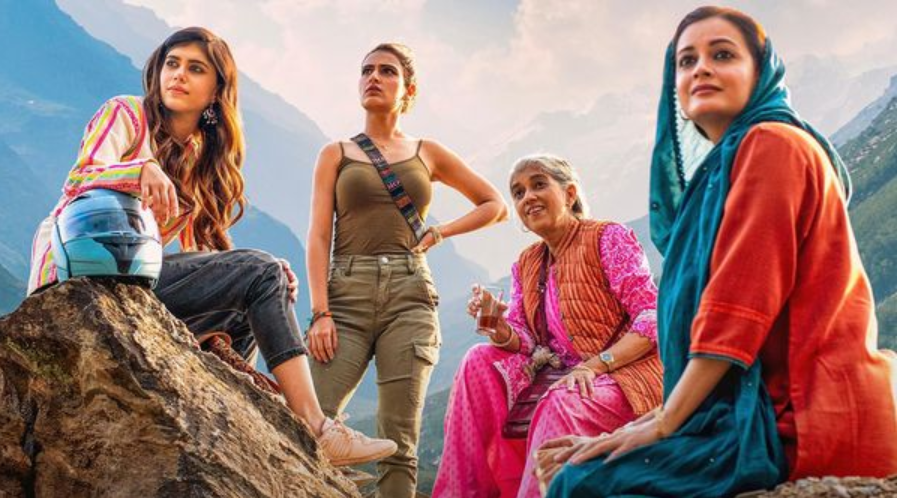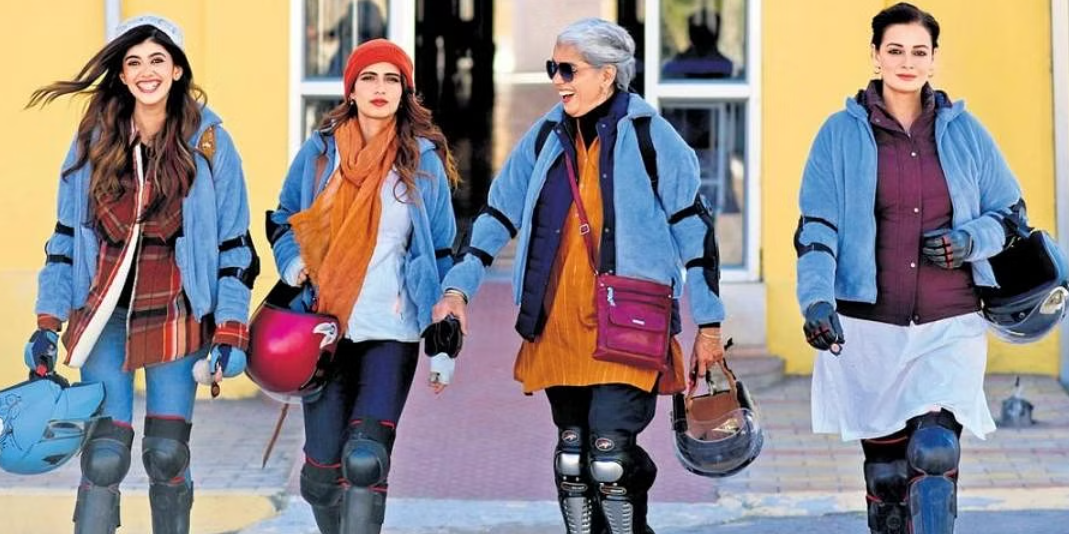“Dhak Dhak” narrates the tale of an unconventional, all-female biker squad as they embark on a journey together from Delhi to Khardung La in Ladakh, renowned as the world’s highest motorable pass and a revered pilgrimage site for bikers. The diverse group, under the leadership of social media vlogger Sky (played by Fatima Sana Shaikh), consists of Mahi (portrayed by Ratna Pathak Shah), an elderly Sikh grandmother; Uzma (enacted by Dia Mirza), a middle-aged Muslim garage owner; and Manjari (brought to life by Sanjana Sanghi), a shy young woman who is about to get married.
Plot:
“Dhak Dhak”, helmed by director Tarun Dudeja, delves into the theme of female camaraderie among four complete strangers. These women, from different age groups, faiths, and outlooks set out on a motorcycle journey from Delhi to Khardung La in Ladakh, each motivated by distinct personal reasons.
Sky (played by Fatima Sana Sheikh), a tech-savvy social media influencer, sees this as an opportunity for an overseas assignment, while Mahi (portrayed by Ratna Pathak Shah), a senior citizen, aims to make a statement to her self-centred family.
Uzma (enacted by Dia Mirza) is in need of money to purchase a laptop for her dedicated daughter since her chauvinistic husband refuses to support her. Manjari (portrayed by Sanjana Sanghi), on the other hand, is a modern-day Simran, embarking on a quest to ‘live her life’ before she commits to a relationship with a complete stranger.
Cast:
Shah, portraying the eldest character, serves as the driving force behind the movie. On the other hand, Mirza, Shaikh, and Sanghi act as the accelerators. As each character’s journey unfolds, you continually recognise that the casting has been exceptionally well-suited, and every actor remains faithful to their respective roles. Combining four separate narratives into a single film is always a risky endeavour, but Dudeja has skilfully crafted a heartfelt, poignant, and purposeful storyline that will awaken the wanderer within you.
Sky and Manjari essentially serve as contrasting archetypes. Where one is confident, the other is timid. While one uses profanity without reservation, the other can’t initiate a conversation without a “Radhe Radhe” greeting. One takes charge, while the other struggles to even keep up.

After “Made In Heaven 2,” Mirza once again portrayed a Muslim woman married to an apathetic and chauvinistic husband, in the film. However, unlike her previous role, Uzma in “Dhak Dhak” doesn’t come from a wealthy background. Nevertheless, she looks just as graceful and dignified. It’s as if she can’t escape being radiantly extraordinary, even in the role of a mechanic’s wife on a road trip filled with dirt, sunburns, and bruises.
The standout performer in this road-trip movie is unquestionably Ratna Pathak Shah. She brings a sense of genuine sorrow to the character of Mahi, skilfully stopping it from veering into overly sentimental territory. You can sense her isolation, yet she doesn’t allow you to feel sorry for her. In fact, all the film’s idiosyncrasies and comedic instances revolve around her character.
What Works For The Film?
In the film, the portrayal of courage takes on various forms. From riding a Royal Enfield in traditional salwar-kameez to embarking on a journey with complete strangers just to gather the funds for a laptop for one’s teenage daughter or the desire to break free from a life that feels excessively constricting, even if it’s just for a week.
Dudeja, who is also the scriptwriter, highlights the suppression of women in contemporary society and the potential they can unlock when they find freedom and embrace the journey of life. Shah’s character is capable of evoking both laughter and tears, thanks to her swift shifts in emotions and dialogues that reveal the hardships she has endured in her lifetime.
On the other hand, Mirza’s Uzma embodies a typical Muslim wife who has sacrificed her dreams for the sake of her family. Yet, her skills and inventive ideas serve as timely reminders of how women can cleverly outmanoeuvre anyone when the situation calls for it.
Fatima’s unwavering self-assurance and inquisitiveness serve her well. Similarly, Sanjana Sanghi’s innocence may appear implausible, but it’s always portrayed sincerely.
What Doesn’t Work?
While patriarchy and misogyny are widespread issues, women have other concerns too. In this film, the challenges that women face are quite predictable, much like their intended trip. One person comments, ‘You remind me of my youth,’ while another remarks, ‘I have a daughter just as old as you.’ Someone falls ill, another becomes upset, someone leaves, while another undergoes personal growth.
All four indulge in drinking and share laughter over typical sexual topics. Men are portrayed as emotionally distant, but their constant presence in their thoughts renders “Dhak Dhak” another film that does not adequately address gender dynamics and female-centric interactions!
Also, “Dhak Dhak,” although somewhat lengthy, never reaches its maximum momentum. It starts off quite well in the first half but experiences a somewhat wandering phase after the intermission. The pacing is irregular, the humour comes and goes, and several scenes linger longer than necessary.
Final Verdict:
Despite inconsistent pacing, and overly prolonged scenes, the personal and shared adventures of these women are quite enjoyable. The four lead actors deliver exceptional performances, conveying their desire for freedom with a blend of warmth and humour. In conclusion, “Dhak Dhak” is a movie for those who are curious to know: “What matters more, the journey or the destination?”











